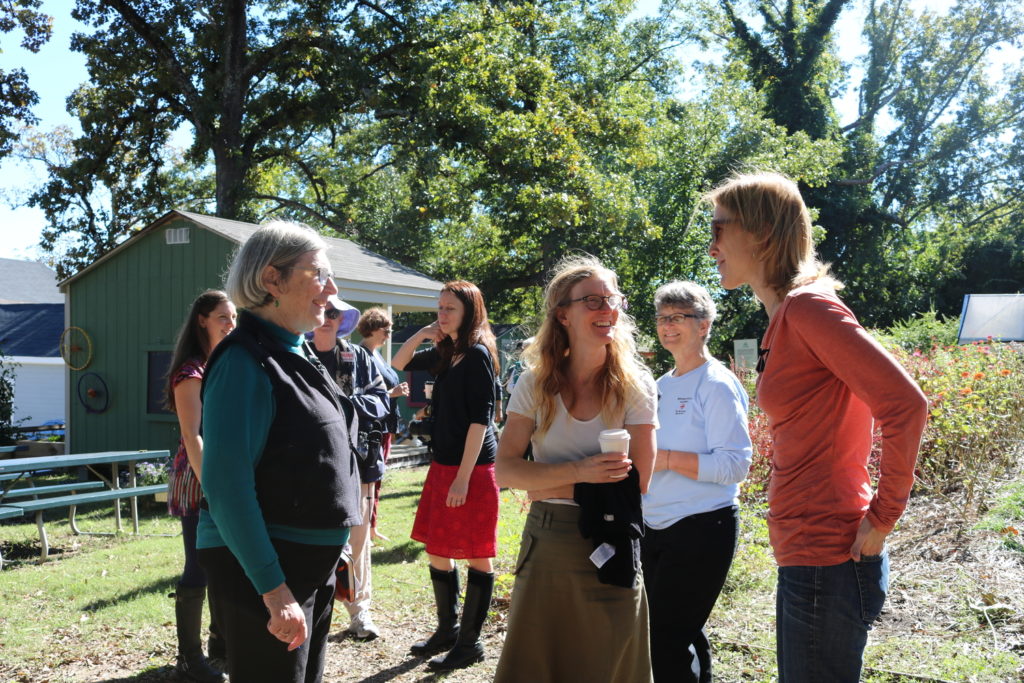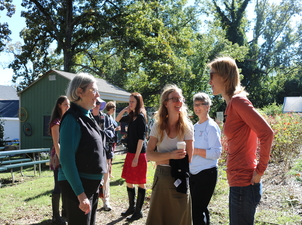
We Are Truly One Body
Economic Interdependence Shows the Depth of Our Connection to One Another
Sister Simone Campbell
August 22, 2019
One of my favorite spiritual realities is that we are the body of God. All of us together make up the image of the Divine. We have different parts to play in the body, but we all serve in order to allow the other parts to function fully.
This image came to mind as I was at one of our rural roundtable listening sessions. Folks were talking about the challenge of being a farmer and only getting income once or twice a year when you sell your crops. This means that (unless you have other income) you have to stretch that money across the whole year. Dairy farmers around the table spoke up and said that in the dairy business they are paid more regularly because they sell their milk every day. For them, however, the challenge is that milk prices are so low that it is almost impossible to stay in business. The way the dairy farmers talked, it was faithfulness to their cattle that kept them going.
These farmers told us one of the big deterrents to family farms is the fact that many bills, like healthcare premiums, come on a monthly basis. This system is designed to work for salaried employees but not farmers.
I began to see that other businesses in farming communities then have different business models depending on how well the crops do on the market or the price of milk. Farming communities live, by necessity, in an interdependent economy of which I as a life-long “city person” was unaware.
 As the conversation continued, I realized the Earned Income Tax Credit (EITC) is an essential boost to rural economies. When families receive their tax returns, they can make purchases at local businesses that they would not otherwise be able to afford. This boosts the local economy and supports families.
As the conversation continued, I realized the Earned Income Tax Credit (EITC) is an essential boost to rural economies. When families receive their tax returns, they can make purchases at local businesses that they would not otherwise be able to afford. This boosts the local economy and supports families.
It is this interrelationship that makes me know the living, breathing reality that we are one body. We are profoundly connected both economically and socially. The Earned Income Tax Credit, and the ways we organize our tax code, are one specific instance where we can see this interdependence.
This same reality of community interdependence exists in our nation’s urban areas, but it is more difficult to see because of the size of the economy. In areas with larger economies, the EITC’s impact for the families that receive it is significant, but businesses are less likely to notice a distinct impact. Still, the impact is there.
However, while the Earned Income Tax Credit aims to supplement low-wage earners’ income and succeeds on many counts, there are some gaping holes in the system. The EITC as it is currently designed leaves out childless adults as well as people who earn less than $3,000 in a year from salaried employment. Those who fall into these categories and are left out are struggling mightily to thrive and flourish in our nation. AND small businesses in their communities are struggling too. This is how we are “one body” in our nation. We are interconnected.
For this reason, we at NETWORK believe we must expand the Earned Income Tax Credit. Doing so will benefit families and entire communities. The benefit is felt most directly in rural communities, but it is also true in cities and suburban neighborhoods. We are connected in this one body.
Therefore, we are working with partner organizations, Members of Congress, our NETWORK members, and advocates across the country to expand the Earned Income Tax Credit and other tax credits to benefit families who are working but still not getting by in our nation. We are advocating for a tax policy that does a better job of helping the households and communities most in need. The one, interconnected body of our nation requires everyone to flourish for our nation to succeed. Federal policy should ensure that all of our families can live in dignity. Expanding the EITC would be one more step towards meeting our communal duty to our neighbors.
This communal duty is at the heart of the Gospel call to love one another. Oh one body, let us respond to the needs of our sisters and brothers and make this change for the common good.







